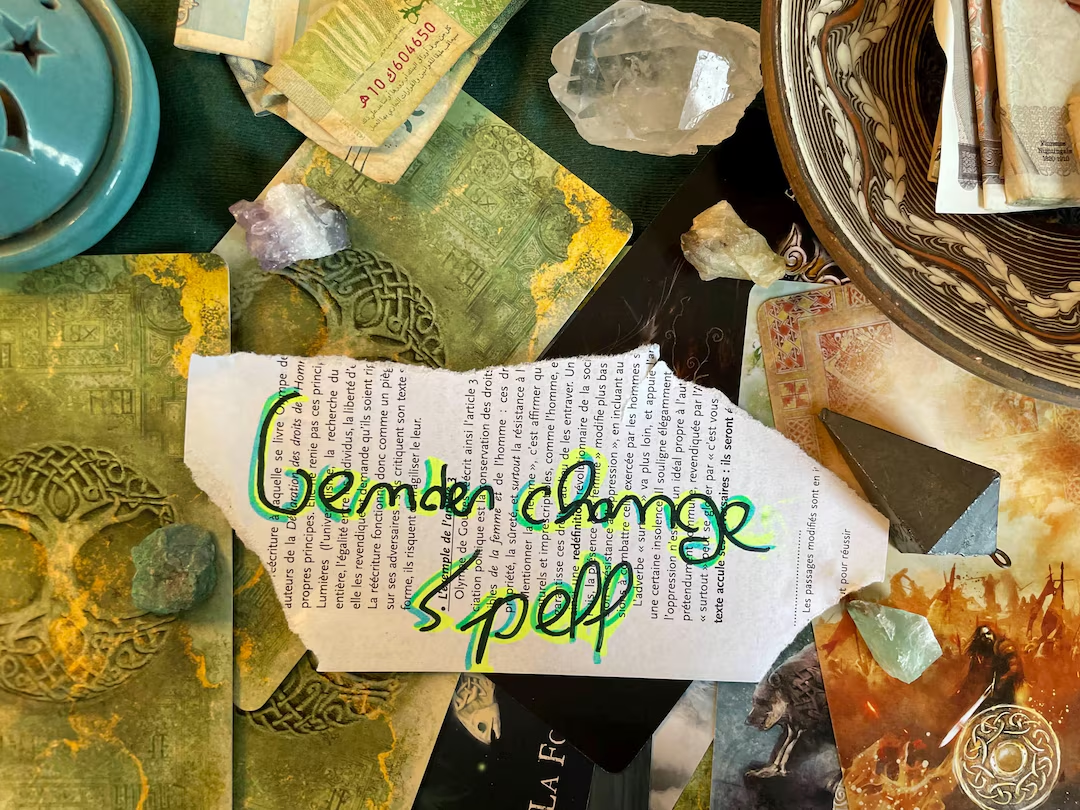Introduction to Court Case Spells
Court case spells, rooted deeply in various cultural beliefs and practices, represent an intriguing intersection between the mystical and legal realms. These spells are often perceived as a means to influence the outcomes of judicial proceedings, reflecting a historical dependence on supernatural elements in seeking justice. Practitioners of these spells assert that they can positively impact legal matters, enhancing one’s chances of favorable judgments or verdicts.
The concept of casting court case spells taps into a broader tradition of using magic to address life’s challenges. Many individuals believe that spiritual forces can intervene in earthly matters, including court cases. This belief can be traced back to ancient civilizations, where rituals and incantations were performed to appease deities or seek their favor in disputes. Such practices continue to be prevalent in various societies where faith in the unseen is intricately woven into daily life.
<pfurthermore, a="" about="" achieving="" adversaries,="" against="" agency="" allure="" and="" as="" attitudes="" authority,="" beyond="" can="" case="" court="" empowerment,="" engaging="" extends="" favorable="" feel="" for="" hope="" in="" individuals="" justice,="" legal="" magical="" means="" mere="" much="" of="" offer="" outcome.
This section has provided an overview of what court case spells entail, as well as their cultural implications and the underlying belief systems that support their use. Understanding these elements is crucial for appreciating the context in which such practices exist, illustrating the ways in which people seek to harness the power of the supernatural in the realm of justice.
Understanding the Principle Behind Spells
The practice of spellwork is deeply rooted in the belief that intentional energy can influence outcomes in various aspects of life, including legal affairs. Central to the effectiveness of a spell is the concept of intention. Practitioners assert that the clearer and more focused one’s intention is, the greater the potential impact of the spell. This forms the foundation for casting spells, as individuals channel their hopes and desires into a specific energy form, which is thought to affect the surrounding environment and circumstances.
In addition to intention, energy plays a critical role in the process of spellwork. Many believe that every thought, emotion, and action generates a unique vibrational energy signature. When casting spells, practitioners strive to align their personal energy with universal energy, creating an amplified force that can influence events and outcomes. This alignment is crucial, especially in the context of court cases, where the stakes can be particularly high. The energy raised during a spell is envisioned as a tool for shaping reality, directing it toward a favorable resolution in legal matters.
Belief also serves as a significant component in the realm of spellcasting. The conviction that a spell possesses real power can enhance its effect. This principle hinges on the understanding that belief can alter perceptions and experiences, thereby influencing the outcomes in one’s life. For those seeking to win a court case, the combination of focused intention, directed energy, and a robust belief system creates a powerful synergy that is believed to manifest desired results. Through this framework, practitioners perceive spells not merely as ritualistic practices, but as means of enacting tangible change that can be observed in the legal system.
The Importance of Intention and Visualization
When engaging in a ‘win a court case’ spell, the foundations of both intention and visualization play an integral role in the spell’s effectiveness. The initial step involves formulating a clear and concise intention, which serves as a guiding principle throughout the spell-casting process. A well-defined intention not only clarifies the desired outcome but also aligns one’s energy with those specific goals. This clarity is essential; without a focused intention, the spell may lack direction and purpose, thus reducing its potency.
Once the intention has been established, visualization becomes a crucial technique to enhance the spell’s efficacy. Visualization involves creating a vivid mental image of the desired outcome, such as a favorable judgment in a court case. This practice can take various forms: visualizing oneself standing confidently before a judge, hearing the ruling in one’s favor, or even picturing the supportive reaction of friends and family after the verdict is announced. By immersing oneself in these images, an individual taps into the powerful forces of the mind, which can influence external circumstances.
Moreover, emotional preparation is equally vital in this process. One must cultivate a positive mindset, channeling feelings of confidence and assertiveness. Techniques such as meditation or affirmations can help in fostering this emotional state. By affirming success and visualizing a positive outcome regularly, one strengthens the connection between their intention and the universe’s response. As practitioners prepare mentally and emotionally, they set the stage for the spell to manifest the desired results.
In summary, the roles of intention and visualization in performing a ‘win a court case’ spell cannot be overstated. By concentrating on a precise intention, visualizing success with clarity, and preparing emotionally, one creates a conducive environment for achieving their legal aspirations.
Materials and Ingredients for the Spell
When preparing to perform a win a court case spell, the selection of appropriate materials and ingredients is crucial to enhancing the spell’s effectiveness. Each item used carries its own spiritual significance, ensuring a focused energy flow during the ritual. Below are some commonly utilized materials in this practice.
Candles play a vital role in many spellwork traditions. They are often used to represent specific energies and intentions. For a win a court case spell, a green candle is ideal as it symbolizes prosperity and success. Alternatively, a white candle can be employed, representing purity and clarity in legal matters. It is important to source candles made from natural wax, as they tend to burn more cleanly and resonate better with the intentions set.
Herbs also play a key role in the crafting of the spell. Consider including herbs such as basil, known for its protective qualities and ability to attract positive outcomes, and chamomile, which promotes calmness and peace during legal proceedings. Dried versions of these herbs can be easily sourced from health food stores or herbal shops. When using herbs, they can be sprinkled around candles or added to charm bags to amplify their properties.
Crystals furthermore add another layer of energy and intention to the spell. Stones like citrine can aid in manifesting success, while clear quartz can amplify the energies of the other materials used in the spell. Both can be found at local metaphysical shops or online retailers. It is advisable to cleanse these crystals of any previous energies before use, typically through methods such as smudging or placing them in salt.
In addition to these components, other tools such as a small bowl for water or a personal item linked to the court case can enhance focus. Incorporating these materials with intention will create a powerful synergy, potentially leading to a favorable outcome in legal matters.
Step-by-Step Guide to Casting the Spell
Casting a win a court case spell requires careful preparation and adherence to specific steps to ensure its effectiveness. Begin by creating a conducive environment for the spell work, as this can significantly influence the outcome. Choose a quiet, undisturbed space where you can focus intently on the task at hand. Gather all necessary materials, including a green candle symbolizing prosperity and success, a piece of paper, a pen, and any personal items that connect you to the case.
Once your space is prepared, the next step involves setting your intentions clearly. Write down your intentions on the paper, detailing the outcome you desire from the court case. Be specific about the verdict you hope to receive, avoiding vague language. After writing your intentions, fold the paper and place it under the green candle. This signifies that your desires are being anchored into the spell.
Lighting the candle is a pivotal moment in the spell-casting process. As you light the green candle, focus your energy and recite a chant or affirmation that reflects your hopes for the court case. This could be a simple phrase like, “Justice shall prevail,” repeated several times. Visualize the court case unfolding in the way you wish, picturing the judge or jury responding favorably to your arguments.
It is recommended to allow the candle to burn down completely, if possible, as this signifies the release of your intention into the universe. However, if time is a constraint, consider letting it burn for at least a couple of hours before extinguishing it. Regardless, ensure to safely snuff out the candle and dispose of the remnants, including the folded intention paper, in a manner that feels right to you—whether by burying it, discarding it in flowing water, or burning it, thus concluding the spell responsibly.
Timing and Astrological Considerations
When it comes to casting a win a court case spell, timing is a critical element that can significantly influence the spell’s effectiveness. Aligning the performance of the spell with specific astrological factors enhances its potential outcomes. Astrological events such as moon phases, planetary alignments, and transits can create an ideal environment for manifesting desired results in legal matters.
The moon phases, in particular, have long been regarded as influential in spellwork. The waxing moon, from the new moon to the full moon, is considered the most favorable period for attracting positive outcomes and growth. This phase is when energies are increasing and can enhance the intention behind your win a court case spell. The full moon, being a time of culmination, is also potent for spells aimed at manifesting desires into reality, including favorable legal judgments. Therefore, practitioners should consider performing spells during these lunar stages to harness the amplification of energies.
In addition to the moon phases, it is essential to take note of specific astrological transits that can resonate with legal matters. For instance, Libra, the sign of balance and justice, is particularly advantageous for legal spells, making the new moon in Libra an optimal time to perform your ritual. Similarly, the placement of planets like Jupiter, associated with luck and expansion, can further boost success when casting spells aimed at winning court cases. Monitoring these cosmic events and aligning your spellcasting to their cycles can create a harmonious connection between your intentions and universal energies.
Ultimately, understanding the interplay between timing and celestial influences can empower individuals seeking justice through a win a court case spell. By thoughtfully selecting the right moments, you can maximize the spell’s potential and pave the way for a favorable outcome.
Ethical Considerations and Legal Implications
The integration of magical practices, such as a win a court case spell, into legal proceedings raises significant ethical concerns. It is essential for practitioners and individuals to approach such spells with a profound sense of responsibility and awareness. The intent behind employing these magical interventions can greatly influence the outcome, both in a legal sense and on a spiritual level. The principle of ethical magic underscores the necessity for aligning one’s intentions with a moral framework, ensuring that one’s actions do not manipulate or unjustly impact others involved in the legal process.
Using a win a court case spell responsibly necessitates a clear understanding of one’s motivations. Practitioners must reflect on whether their intentions serve justice or merely personal gain. Engaging in magical practices with selfish motives can result in adverse consequences on one’s karma. The concept of karma emphasizes that actions taken in the quest for justice can ripple outwards, affecting not only the individual who casts the spell but also the broader community. Ethical magic encourages individuals to seek harmony and balance, rather than favoring one party at the expense of another.
Moreover, legal systems are constructed on the principles of fairness and equity, and the introduction of magical elements can disrupt these foundations. It is crucial for individuals to consider the legal implications of utilizing a win a court case spell. The act of influencing legal outcomes through non-traditional means may not only undermine one’s credibility but also lead to legal repercussions. Thus, engaging with spellwork in the context of court cases requires a delicate balance between fervent desire for justice and the responsibility of adhering to legal systems and ethical standards.
Real-Life Testimonials and Experiences
The journey to achieving justice can often feel daunting, but many individuals have shared their uplifting experiences with win a court case spells that catalyzed favorable outcomes in their legal battles. These testimonials highlight the transformative power of such spells, showcasing their versatility across different types of cases, from small claims to more complex litigation.
One notable account comes from Jane, a single mother who found herself entangled in a custody battle. Facing what seemed an insurmountable challenge, she consulted a practitioner specializing in win a court case spells. Jane reported that the spell not only provided her with confidence but also appeared to shift the dynamics of her court hearings. “It felt as if the universe was aligning in my favor,” she expressed, ultimately leading to a positive resolution where she retained full custody of her child. This illustrates how personal conviction coupled with a court case spell can influence the judicial process.
Similarly, John’s experience sheds light on the financial dimensions of legal disputes. After facing wrongful termination, he turned to the ancient art of spellcasting as a last resort. John’s testimonial elaborates on the subtle changes he noticed before his court date—an unexpected settlement offer that allowed him to avoid trial. “The spell turned out to be a beacon of hope; I never expected such a quick resolution,” he stated. His story underscores the spell’s ability to bring unexpected benefits to those desperate for a fair outcome in their legal matters.
These real-life experiences serve as poignant reminders of how win a court case spells can potentially become catalysts for justice. The shared sentiments convey a common theme: the empowerment that stems from taking action, supported by the mystical elements of spellwork. As these individuals have demonstrated, the combination of belief, intention, and the use of a court case spell can lead to life-altering changes in the legal realm.
Conclusion and Final Thoughts
Throughout this blog post, we have examined the concept of court case spells and their potential role in the legal process. These spells are often viewed as an empowering tool that individuals may employ to influence the outcomes of legal proceedings. While some practitioners believe in the efficacy of such magical works, it is essential to approach this practice with caution and a deep respect for the legal system. The intersection of magic and legal matters is complex; thus, understanding the implications of utilizing a court case spell is paramount.
Additionally, while the allure of achieving a favorable judgment through mystical means can be compelling, it is vital to maintain a balanced perspective. Engaging with such practices shouldn’t replace the necessity for sound legal advice and representation. Court case spells can serve as a form of emotional support—offering hope and confidence during what can be a daunting process. However, they must complement, rather than substitute, conventional legal strategies. Practitioners are encouraged to remain grounded in their beliefs, ensuring that their magical practices align with ethical considerations.
Ultimately, the exploration of court case spells invites individuals to delve deeper into their own belief systems and the broader context of magic. Whether one is an avid practitioner, a curious onlooker, or a skeptic, exploring this realm can lead to personal insights and growth. As we conclude, readers are encouraged to reflect on the broader implications of their beliefs and how these may shape their experiences in both the magical and legal realms. By doing so, one can navigate the intricate dynamics of justice and magic with confidence and understanding.









